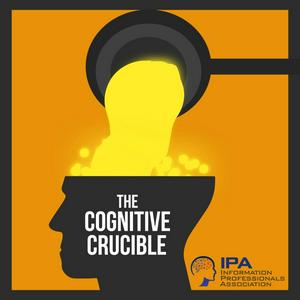The Cognitive Crucible is a forum that presents different perspectives and emerging thought leadership related to the information environment. The opinions expressed by guests are their own, and do not necessarily reflect the views of or endorsement by the Information Professionals Association.
During this episode, Andrew Whiskeyman discusses his co-authored article: The Emergence of Cognitive Intelligence (COGINT) as a New Military Intelligence Collection Discipline. "COGINT" is the systematic mapping, safeguarding, and operational exploitation of decision-making architectures in the contemporary cognitive battle space. Topics include: understanding and protecting human decision-making processes from adversarial tactics, adversarial exploitation of technology and societal divisions to manipulate public opinion, and underscoring the vital need for critical thinking.
Recording Date: 22 January 2026
Research Question: Andrew Whiskeyman suggests an interested student or researcher examine:
When is a conspiracy theory no longer a theory?
How does one build a culture of civil discourse and disagreement?
Of mobs and men: how does individual behavior and decision relate to group dynamics?
AI and human trust/decision dynamics.
Resources:
Cognitive Crucible Podcast Episodes Mentioned #62 Jonathan Rauch on the Constitution of Knowledge
#119 Katherine Carman on Truth Decay
#153 Andy Whiskeyman and Mike Berger on the Importance of Dedicated Resources
The Emergence of Cognitive Intelligence (COGINT) as a New Military Intelligence Collection Discipline by Jorge Conde and Andy Whiskeyman
S. Rept. 119-39 - National Defense Authorization Act (NDAA) for Fiscal Year 2026 dated 15 July 2025
Salt Typhoon
The Everlasting Man: A Guide to G.K. Chesterton's Masterpiece by Dale Ahlquist
Aristotle's Rhetoric
The Structure of Scientific Revolutions by Thomas Kuhn
Warhead: How the brain shapes war and war shapes the brain by Nicholas Wright
Link to full show notes and resources
Guest Bio:
Dr. Andrew Whiskeyman, COL (ret.), is the co-founder and CEO of JASSA Professional Services, which provides consulting and subject matter expertise on strategy, technology, predictive analysis, and people. He also teaches, writes, researches, and lectures internationally on the topics of information warfare, cognitive security, emerging technology, and strategic foresight.
He is a Goodpaster Scholar, a non-resident senior fellow with the Global National Security Institute (GNSI) and former board member of the Information Professionals Association (IPA). Dr. Whiskeyman adjuncts with Catholic Polytechnic University, Syracuse University's Maxwell School of Citizenship and Public Affairs, and the US Air Force's Air War College.
He is a former Chair of the Cyber Strategy Department at the National Defense University's College of Information and Cyberspace (CIC) where he taught and researched on the nexus of information and national security. He previously served for 28 years in the US Army and deployed multiple times in support of combat operations.
His final military assignment was as the Chief of the Information Operations Division (J39) within the U.S. Central Command (CENTCOM) Operations Directorate J3 located at Macdill AFB, Florida. His previous assignment was as the Chief of Strategy for the CENTCOM Joint Cyber Center (JCC). His first assignment was to Misawa AB, Japan as an enlisted military intelligence Soldier. He then went to officer candidate school (OCS) and commissioned into the basic branch of Air Defense Artillery. In 2007, he transitioned to the Information Operations functional area (FA30).
He has deployed five times: Kosovo (KFOR 3B - 2001/02), Afghanistan (3 times - 2004, 2006/07, and 2012/13), and Iraq (2008/09). He also has numerous shorter trips into the Middle East theater of operations including return trips to Iraq and Afghanistan.
He is a graduate (and plank owner) of the Marine Corps Expeditionary Warfare School (EWS - 2004), Air Command and Staff College (ACSC 2011 in residence), and the School of Advanced Air and Space Studies (SAASS XXI - 2012). He is the first Soldier with the Advanced Strategic Planning and Policy Program (ASP3) to earn his PhD (Military Strategy, Air University 2015). He is the recipient of multiple military awards including the Defense Superior Service Medal and the Bronze Star, and he was awarded France's Chevalier de L'Ordre du National Mérite.
He is also active in the Tampa Bay community. He is the founder of the local Tampa Bay GK Chesterton Society, leads an Exodus 90 fraternity, served as a past Grand Knight for the Servant of God Vincent Capodanno Council 14495 (Knights of Columbus), created and teaches two Apologetics Courses for Homeschool students, and is a mentor with the Tepeyac Leadership Institute.
He is married (over 30 years) with four children, two grandchildren, two dogs, and a turtle.
About: The Information Professionals Association (IPA) is a non-profit organization dedicated to exploring the role of information activities, such as influence and cognitive security, within the national security sector and helping to bridge the divide between operations and research. Its goal is to increase interdisciplinary collaboration between scholars and practitioners and policymakers with an interest in this domain.
For more information, please contact us at
[email protected].
Or, connect directly with The Cognitive Crucible podcast host, John Bicknell, on LinkedIn.
Disclosure: As an Amazon Associate, 1) IPA earns from qualifying purchases, 2) IPA gets commissions for purchases made through links in this post.


